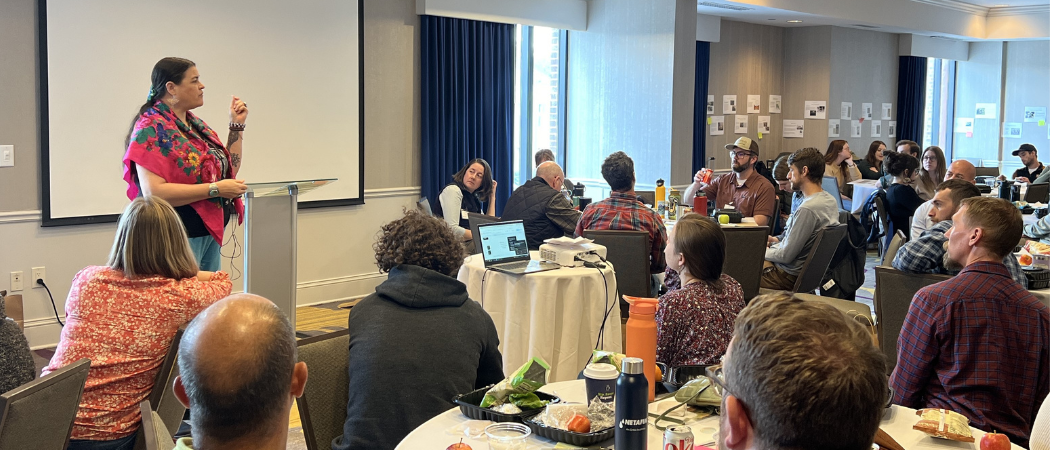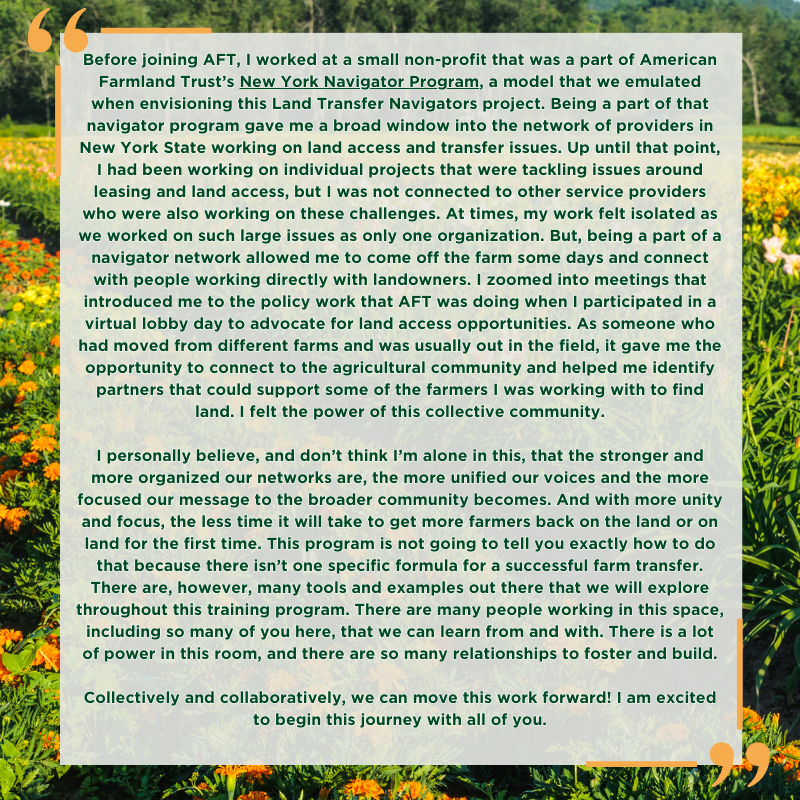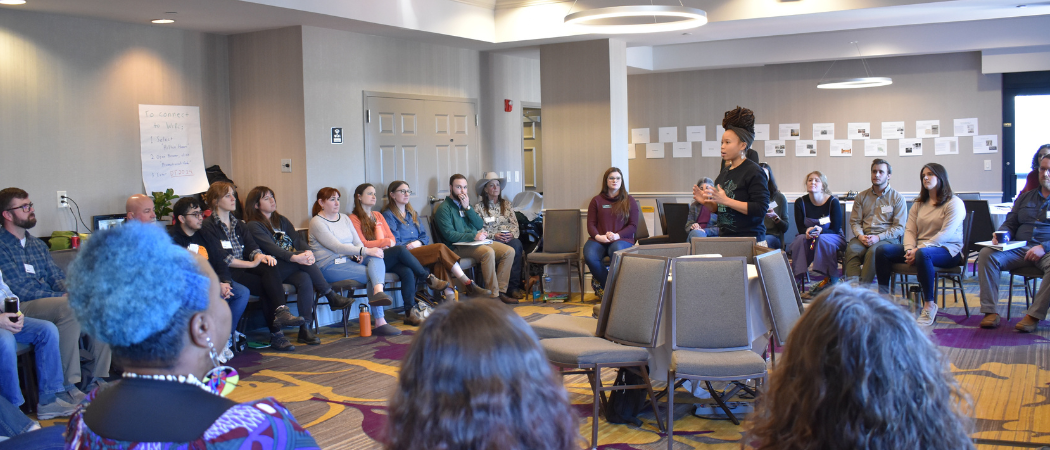Reflections from Our First Land Transfer Navigators Training

At the end of January, our Land Transfer Navigators cohort met in Savannah, Georgia, for our first in-person training. It was a big moment for us as an organization, and it was a big moment for me. As AFT’s Education and Training Manager and a member of our Farms for a New Generation team, I had spent months working with colleagues to plan the training.
By now, many readers may be familiar with the Land Transfer Navigators project. But for those who aren’t, here’s a quick primer. AFT’s data suggests that over the next two decades, around a third of all American agricultural land will change hands as older farmers and ranchers retire and, to be candid, pass away. That means 300 million acres of farmland will soon shift to new owners, a massive transition that could reshape the country’s agricultural landscape. How that land transfers and to whom it transfers matters.
Retiring and aspiring farmers and ranchers must “navigate” economically, logistically, and emotionally complex issues for a successful transfer to happen. By working with AFT staff and other conservation leaders from across the country, many of whom have cultivated trusting relationships with agricultural communities through years of grounded service, the Land Transfer Navigators project seeks to help aging farmers retire with confidence while helping new, beginning, and underserved farmers access land. The program represents a holistic approach to the issue of land transfer that considers both sides of the spectrum. It’s an innovative strategy for addressing one of the defining agricultural issues of our generation.

Alone, Land Transfer Navigators won’t solve the challenge. But by nurturing a strong community of partners and helping to increase awareness and action, we feel like the project will make a meaningful difference.
That’s the attitude we brought with us to Savannah. Alongside strategic plans and minute-by-minute agendas and dozens of binders filled with educational content, we came with a sense of hope that our time, effort, and energy could truly help exiting and beginning farmers secure a better future.
For me, that hope was rooted in tangible experience. To help you understand why I care about this work—to help you understand why I believe in it—I’ll share an excerpt from a speech I gave during our gathering in Georgia:
 Over three jam-packed days, we started to discuss land transfer tools together. We dove into conversations about conservation easements, lease-to-own models, taxes, heirs’ property, succession and estate plans, mortgages, and more. We heard directly from farmers who have navigated their own farm transfer processes, and we learned from Navigator organizations who have already been engaging in this work.
Over three jam-packed days, we started to discuss land transfer tools together. We dove into conversations about conservation easements, lease-to-own models, taxes, heirs’ property, succession and estate plans, mortgages, and more. We heard directly from farmers who have navigated their own farm transfer processes, and we learned from Navigator organizations who have already been engaging in this work.
And we definitely built relationships. I left Savannah with more knowledge, which is essential. But perhaps more importantly, I left with a new network of people from across the nation who are committed to serving agricultural communities now and in the future.
I left with even more hope than when I arrived.

But that’s enough from me. Many of our Navigators felt the same way. In brief interviews, they shared their thoughts and feelings about the project:
“We’re excited to be getting into the succession planning and land transfer process with our clients. It’s a natural part of the work that we do in this consultative process with landowners. We help them figure out what the best process is to reach their goals. We are at such an important time in history with so much land about to change hands… We know that the renewed enthusiasm from young people coming into farming is going to be so important to the whole farmland conservation goal. Because conserving land is one thing, and it’s so important—but making sure that it’s stewarded and remains productive is crucial, too.” — Jeremy Christensen of the Utah Department of Agriculture
“We have been very successful on farmland protection… But we’re looking to expand beyond agricultural land protection and explore how to provide more resources to the landowners we work with and have developed relationships with over the years. … Like the rest of the country, our part of Michigan has seen escalated land values. We’ve seen aging farmers that want their farm to remain a farm but are struggling to identify successors. Again, the affordability of farmland continues to be probably the greatest hurdle for someone new to come in. We’re just looking to see what role we can play in that—and also how we can create a better network of service providers to assist in some of these land transfer projects.” — Laura Rigan of Grand Traverse Regional Land Conservancy
“For me, this issue is both personal and professional. I come from a farm family that, like all farm families, is faced with these very questions and challenges of how to transfer land. How do you engage with, help, and recognize the current generation as well as the coming generations and the different challenges they each have? And then you put that in the context of family and family relations?… These are hard questions. I’m looking forward to learning more about the process, more about the resources that are available and the expertise that is out there in this field of transferring land. I’m looking forward to really encouraging the planned succession of operations. That’s my objective: to help both sides of the process.” —John Currey of Yolo Land Trust
The comments above highlight a shared drive to serve communities across the country through supporting land transfer and farm succession processes. The work won’t be quick, and it won’t be easy. But my experiences—both from my prior work in New York and from being immersed in this community of committed conservationists—suggest that it will be impactful.
Our first in-person training is done, and it was a big success. We’re excited to keep moving forward from here.

